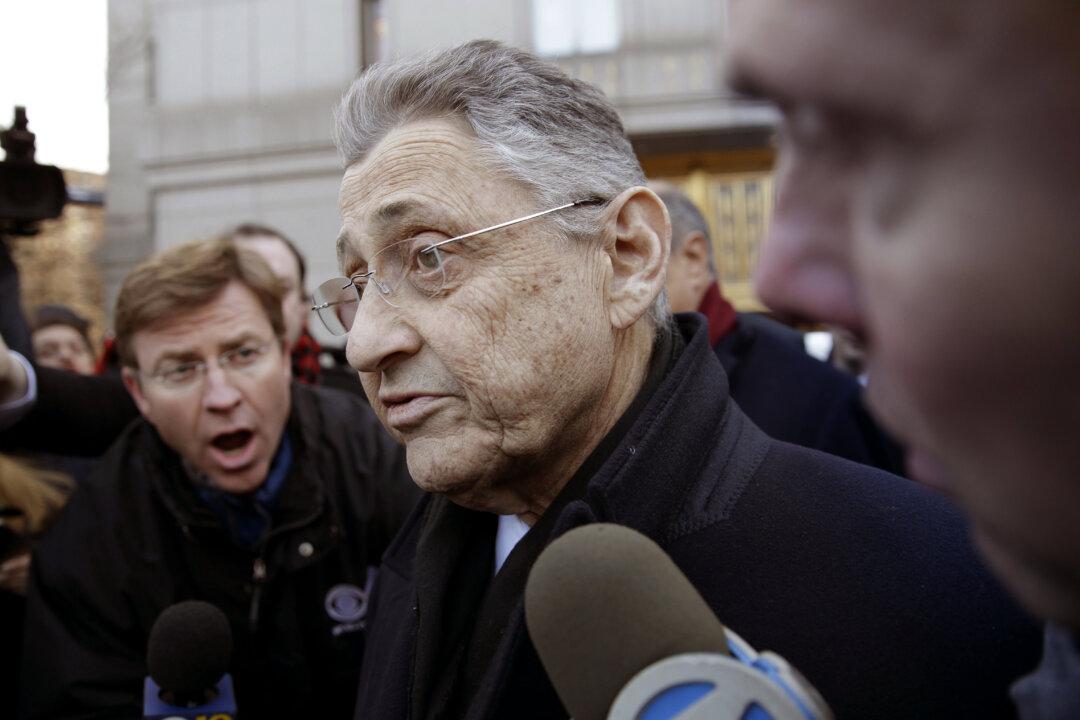New York Assembly Speaker Sheldon Silver probably thought he had gotten away with it.
When Gov. Andrew Cuomo appointed a 22-member panel, known as the Moreland Commission, to investigate corruption in state government, political campaigns, and elections, the panel members got to work right away, requesting state lawmakers to hand over information on their outside sources of income.
Among them was Silver, who reported earnings up to $750,000 at personal injury law firm Weitz & Luxenberg, according to the latest financial disclosure statement from 2013.
It was unclear what Silver was actually doing to earn those paychecks. His financial disclosure says he does “general practice of law” for clients. Other lawmakers similarly had part-time jobs making lucrative amounts.
As the commission closed in on the lawmakers’ finances, subpoenaing their outside employers for information, Silver—a major player in Albany who reigned as Speaker of the State Assembly since 1994—and his colleagues, negotiated a deal with Cuomo to end the commission’s probe. In exchange, they would pass new campaign contributor disclosure and anti-bribery laws that the governor wanted.
In March 2014, after just nine months in operation, the Commission disbanded.
It would take federal intervention—outside forces not beholden to state politics—to finally catch up to what Silver was doing.
On Thursday, Silver was arrested by the FBI (Federal Bureau of Investigation) on charges of corruption and bribery. The investigation into Silver’s finances was conducted by the federal prosecutor, Preet Bharara’s office. The office requested and received files from the Commission’s investigation, some of which aided in the federal probe.
Silver collected $4 million in bribes and kickbacks from Weitz & Luxenberg, a personal injury law firm, and another undisclosed law firm since 2002, according to the criminal complaint filed at a Manhattan federal court on Wednesday.
Silver had disguised the money as legitimate income for his legal services. In fact, federal authorities said, his name does not appear as an attorney for any state or federal court cases.
Silver instead used his power and influence to refer clients—real estate developers and cancer patients who got sick from asbestos exposure—to the law firms, getting compensated in turn.
Investigating Outside Income
Before the Commission ended halfway through its originally planned 18-month tenure, it sent members of the State Assembly and Senate—including Silver—letters asking them to describe the work they did and the clients whom they assisted. Silver refused to comply with the letter.
The Commission then subpoenaed Weitz & Luxenberg for records. In response, Silver compelled the Assembly to file a court motion to fight the subpoenas issued for investigating assembly members’ outside income—including the one issued to Weitz & Luxenberg.
At a press conference in February last year, Silver accused the commission of abusing its subpoena power, and that it was “engaged in a fishing expedition to intimidate legislators.”
Outside income was a major concern for the Commission. In its preliminary report issued in Dec. 2013, it noted that 89 of the 174 lawmakers in New York State listed at least one source of outside income in calendar year 2012. More than 70 percent of them earned more than $20,000 from a single source. The top cited source was for law practice.
The report addressed the lack of stringent reporting requirements. While officials are asked to list their sources of income, they do not have to describe their work in detail. Lawmakers are only required to report the name of a client if they personally provided the service.
In the criminal complaint, federal authorities describe an unnamed real estate developer who owned buildings within Silver’s constituent district, the Lower East Side of Manhattan. Lobbyists hired by the developer met with Silver to discuss renewing legislation that would allow the developer to benefit from state rent regulation and tax abatement programs. In return, the developer became a client of a real estate law firm where Silver received referral fees.
The New York Times first reported in December that the law firm in question is Goldberg & Iryami, a Manhattan firm that helps clients get reductions in city real estate taxes.
To prevent the Commission from digging into his books, Silver negotiated a deal with Cuomo, according to the complaint. The criminal complaint notes Silver played a key role, and had spoken out against “limits to legislators’ outside income and related disclosure requirements.”
At a press conference on Thursday, prosecutor Bharara said he would continue to investigate other officials in Albany. The maximum penalty for Silver’s charges is 100 years in prison.
Silver was released on $200,000 bail the same day. He told reporters he was “confident that after a full hearing and due process, I'll be vindicated on the charges.”
The Associated Press contributed to this report.





